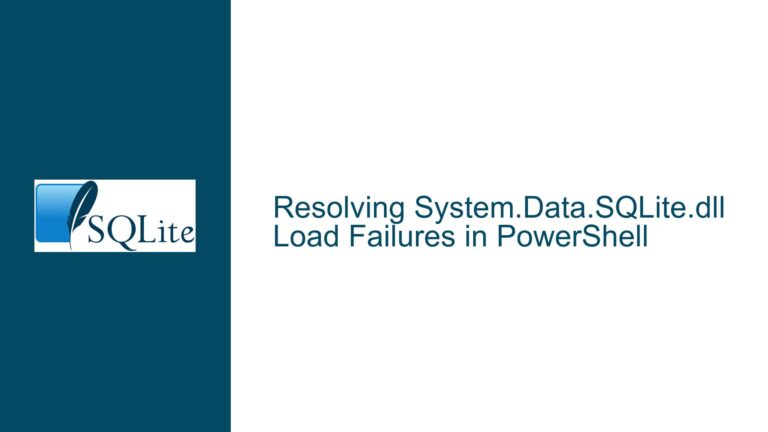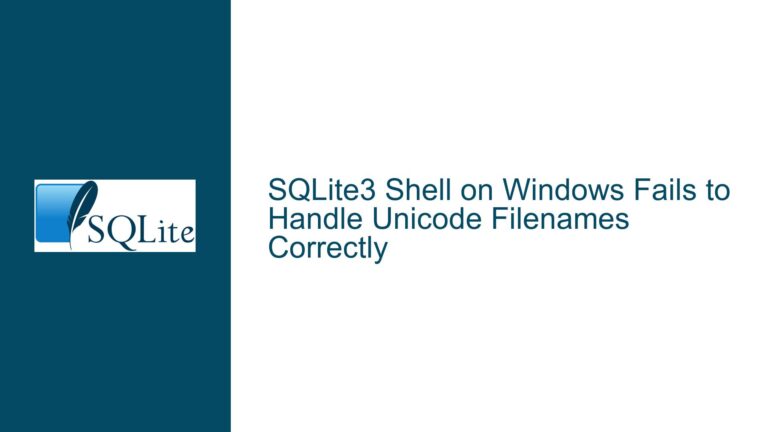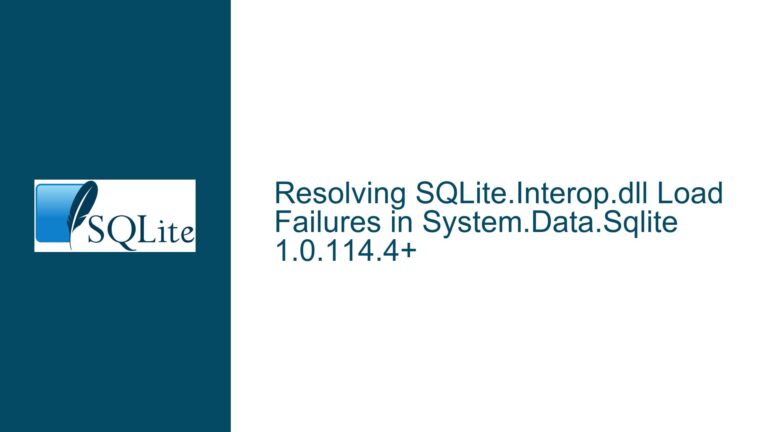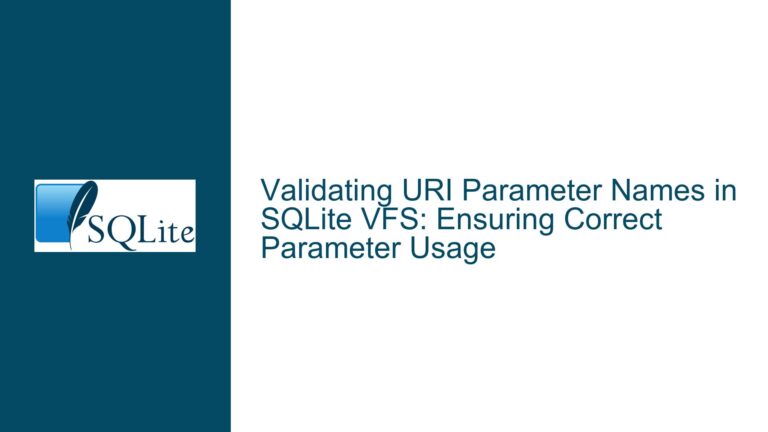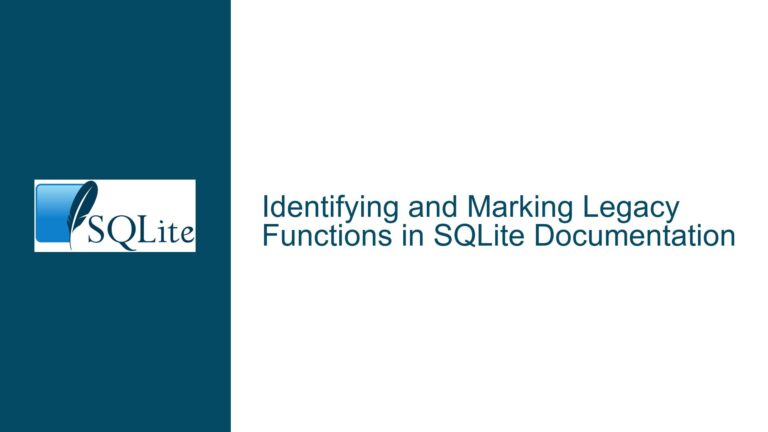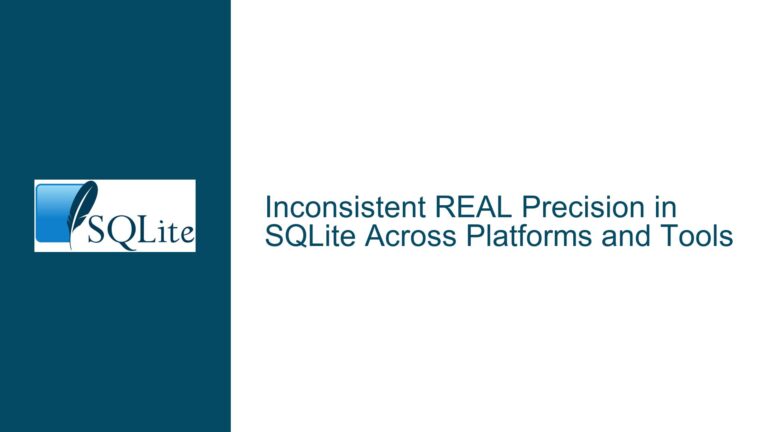SQLite3 CLI Crash on PRAGMA hard_heap_limit=1 with Null Pointer Dereference
Crash Triggered by PRAGMA hard_heap_limit=1 Followed by Invalid Statement
Issue Overview: CLI Crash Due to Null Pointer Dereference During Error Context Handling
The SQLite3 command-line interface (CLI) crashes when executing a specific sequence of statements:
PRAGMA hard_heap_limit=1(sets the maximum heap memory limit to 1 byte).- A subsequent line containing
0(interpreted as an invalid SQL statement).
This crash manifests as a segmentation fault (SEGV) due to a null pointer dereference in the shell_error_context() function. The stack trace reveals that the CLI attempts to read a null pointer (zCode = 0x0) while generating an error message for the failed PRAGMA command. The undefined behavior sanitizer (UBSAN) output explicitly flags this as a "load of null pointer of type ‘char’".
Key Observations from the Discussion:
- The crash occurs in SQLite3 versions containing commit
416602a851(introduced in late 2021) but not in earlier versions. - The bug is reproducible on Linux (x86-64 Ubuntu 20.04) using GCC 9.4.0 with debug flags enabled.
- Other platforms (Windows, macOS, WASM) report
Error: out of memoryfollowed by graceful termination instead of a crash. - The crash requires executing the
PRAGMAstatement followed by an invalid statement (0) in the same input batch (e.g., via a script file).
Technical Context:
- The
PRAGMA hard_heap_limit=1forces an immediate out-of-memory (OOM) error by restricting the heap to 1 byte. - The CLI’s error-handling logic (
shell_error_context()) attempts to highlight the problematic SQL code snippet but fails whenzCode(a pointer to the SQL text) is null. - The commit
416602a851modified error reporting in the CLI, inadvertently introducing a scenario wherezCodeis dereferenced without validation.
Root Causes: Invalid Assumptions in Error Reporting Logic
1. Null Pointer Dereference in shell_error_context()
The function shell_error_context() assumes that zSql (the input SQL string) is always valid and non-null. However, after an OOM error, memory allocation failures may corrupt or invalidate pointers, causing zCode (derived from zSql) to become null. The code attempts to access zCode[iOffset] without checking for nullity, leading to a crash.
2. Interaction Between OOM and Subsequent Statements
The CLI processes input line-by-line. When the PRAGMA command triggers an OOM, the CLI’s internal state (including the database connection and error buffers) becomes inconsistent. The subsequent 0 (invalid SQL) forces the CLI to generate an error message, but the OOM leaves insufficient memory to format the error context correctly.
3. Platform-Specific Behavior Differences
- Linux (Crash): The GNU C library (glibc) and GCC’s memory management may not recover gracefully from OOM conditions, leading to null pointers.
- Windows/macOS (Graceful Exit): These platforms terminate the process immediately after detecting OOM, avoiding the null pointer dereference.
- WASM (Fiddle): JavaScript’s memory constraints and exception handling cause abrupt termination, masking the null pointer issue.
4. Bisect-Identified Regression
The commit 416602a851 ("Improve error messages in the CLI") altered how SQL text is stored and referenced during error reporting. A missing null-check in the revised logic allowed zCode to be dereferenced even when invalid.
Resolution: Code Fixes, Workarounds, and Best Practices
1. Apply the Official Patch
The SQLite team resolved this issue in commit d6893183. The fix involves adding a null-check before dereferencing zCode in shell_error_context():
if( zCode != NULL && iOffset>=0 && iOffset<len ){
// Existing logic to highlight SQL error...
}
Steps to Apply:
- Update to SQLite version 3.40.0 or later.
- If using a custom build, cherry-pick commit
d6893183into your codebase.
2. Workarounds for Unpatched Versions
- Avoid Combining
hard_heap_limit=1with Subsequent Statements:
Execute thePRAGMAcommand in isolation:echo "PRAGMA hard_heap_limit=1;" | sqlite3 - Increase Heap Limit to Prevent OOM:
Use a realistic value (e.g.,PRAGMA hard_heap_limit=1048576) to avoid triggering OOM. - Use
.exitor.quitAfter OOM:
Force the CLI to terminate immediately after the error:PRAGMA hard_heap_limit=1; .exit
3. Debugging and Analysis Techniques
- Reproduce with UBSAN/ASAN:
Compile SQLite with sanitizers to detect undefined behavior:CFLAGS="-fsanitize=undefined,address" ./configure --enable-debug make - Inspect Error Context Generation:
Add logging toshell_error_context()to tracezSqlandzCodevalues:fprintf(stderr, "zSql=%p, zCode=%p\n", zSql, zCode);
4. Best Practices for Handling OOM in SQLite
- Avoid Extreme Heap Limits:
hard_heap_limit=1is a stress-test scenario; use it cautiously. - Validate Input Scripts: Ensure no invalid SQL follows memory-critical commands.
- Monitor CLI State After Errors: Use
.traceor.logto capture internal state changes.
5. Platform-Specific Mitigations
- Linux: Use
ulimit -vto constrain memory at the OS level instead ofhard_heap_limit. - Windows/macOS: Leverage task managers or activity monitors to detect memory exhaustion.
- WASM: Implement custom OOM handlers in JavaScript to reload the SQLite session gracefully.
6. Understanding SQLite’s Error Handling Flow
After an OOM:
- The CLI calls
sqlite3_exec()orsqlite3_prepare_v2(), which returnsSQLITE_NOMEM. shell_exec()invokessave_err_msg()to format the error message.save_err_msg()callsshell_error_context()to generate a contextual snippet of the SQL.- With
zCodenull, the unpatched code crashes atshell.c:17008.
7. Long-Term Code Hygiene
- Add Null Checks in Error-Prone Functions: Audit all CLI functions that dereference user-provided strings.
- Unit Tests for OOM Scenarios: Integrate OOM injection tests into SQLite’s regression suite.
- Document Edge Cases: Explicitly warn users about combining
hard_heap_limitwith multi-statement scripts.
This guide provides a comprehensive roadmap for diagnosing, resolving, and preventing crashes related to PRAGMA hard_heap_limit=1 and null pointer dereferences in SQLite3. By addressing both immediate fixes and long-term code quality measures, developers can ensure robust error handling in memory-constrained environments.

